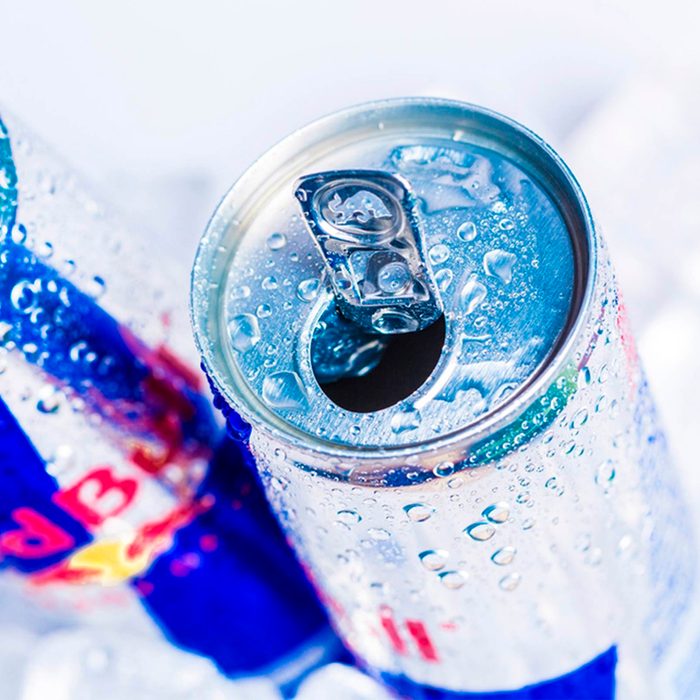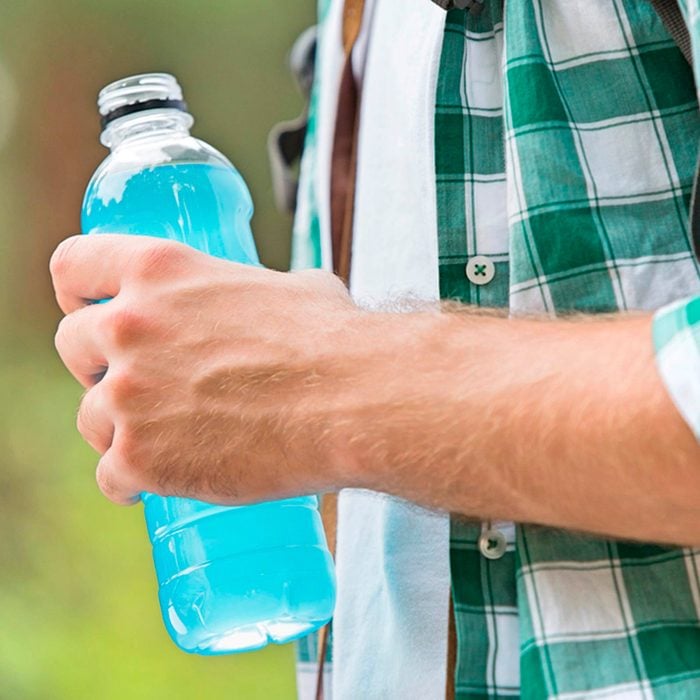
Are energy drinks safe?
In spite of the known dangers of energy drinks, the market for them is booming. In 2016, research from Mintel revealed that more energy drink products were launched globally in 2015 than in any year since 2008, with the number growing 29 percent between 2010 and 2015. In 2015, an incredible 8.8 billion liters were sold across the world, with the U.S. taking the largest slice of that market with volume sales of 3.3 billion liters. This is great news for energy drink manufacturers, but what are consumers really getting when they buy these drinks? We asked experts to reveal exactly what their ingredients do to our bodies. (By the way, here are a few ways you can boost energy naturally—without energy drinks.)

Energy drinks can cause dehydration
The main source of energy in most energy products is caffeine. According to Caffeine Informer, Monster Energy, Rockstar Energy, and NOS Energy all have 160 mg of caffeine in a 16-ounce can. Red Bull has 80 mg of caffeine in an 8.4-ounce can. Caffeine has a diuretic effect, which means it increases urine production. In extreme cases, this can lead to dehydration. It can be particularly harmful in people who drink these products for the first time and don’t know to compensate with extra water, says nutritionist and author Beth Warren. The FDA’s official stance is that people shouldn’t consume more than 400 mg of caffeine per day, but food and drink manufacturers are not required by law to list the amount of caffeine their products contain. These are the drinks that contain the most caffeine.

Energy drinks can increase heart rate
As a diuretic, caffeine also poses a heart rate risk, says nutritionist Lisa Cohn. The Canadian Journal of Cardiology published a comprehensive study in 2015 that looked at the incidences of cardiac events after energy drink consumption among adolescents. They found that energy drink abuse among teens caused increased risk of cardiac events, especially in those with underlying heart conditions. There were even some cases of energy drink products causing changes in heart rhythm among teens with healthy hearts. This risk increases when the child engages in sports or exercise. In some cases, the high caffeine content of these drinks triggered undetected heart conditions, as in the case of a 17-year-old boy who showed up at the emergency department with sudden onset of palpitations after drinking a high caffeine pre-workout energy drink at the gym. Here’s everything you need to know about the world’s strongest coffee.

Energy drinks can damage teeth
Energy drink products contain citric acid, which is highly corrosive to teeth, warns registered dental hygienist Anastasia Turchetta. A study comparing sports drinks and energy drinks found that energy products have significantly higher acidity and greater capacity to dissolve enamel compared to sports drinks. In fact, enamel loss after exposure to energy drinks was more than two times higher than after exposure to sports drinks. “Imagine the collision of citric acid with sugars, and you have the perfect storm for tooth enamel demineralization and/or tooth decay,” says Turchetta. “Once your enamel is gone, it won’t grow back! What’s next? Tooth sensitivity and thinner enamel, which will look more yellow and attract more stains.” What’s even more concerning is that the precise amount of citric acid is not required on the label, so we don’t actually know how much we’re getting.

Energy drinks don’t actually give you energy
They may be called energy drinks, but the truth is that their main ingredients (taurine, L-carnitine and glucuronolactone) don’t provide a genuine energy boost at all. “Taurine and L-carnitine are amino acids involved in energy metabolism and are naturally found in muscle and organ tissue,” Cohn explains. “They are used in energy products but do little to boost energy. Glucuronolactone is often said to increase energy because of its supposed impact on energy metabolism, but it has no real effect on energy levels either.” The perceived energy boost likely comes from sugar (glucose is a major energy source) but it doesn’t last long before the crash comes. And the adverse effects of high sugar content don’t stop there. An energy drink typically contains about 13 teaspoons of sugar per serving—more than double the World Health Organization’s recommended daily limit of 6 teaspoons of added sugar per day. “Over time, this amount of simple sugar exposure contributes to obesity and insulin resistance,” says Warren. “Studies also show that energy products cause complications for those with heart conditions and high blood pressure. In the end, what we know and do not know about the effects of energy products is enough to skip drinking them.” Here’s how to kick your sugar addiction.

Energy drinks can cause headaches and mood swings
Guarana, another common energy drink ingredient, may be a plant, but that doesn’t mean it’s good for you. It’s high in caffeine, even more so per serving than coffee. “Guarana stimulates the central nervous system,” explains Cohn. “This provides a feeling of energy boost and mental clarity, and can reduce appetite. However, it can also cause adverse energy drink side effects such as headaches, insomnia, nervousness, and mood swings; it can be dangerous when combined with prescription medication; and it can cause various side effects, from cardiac and digestive problems to impaired judgement and decision-making.” The real danger of guarana is that it’s not listed as an additional source of caffeine on ingredient lists. “Some young adults have reported being sent to the emergency room because of overdoses of caffeine in the form of guarana-based drinks,” warns Warren.